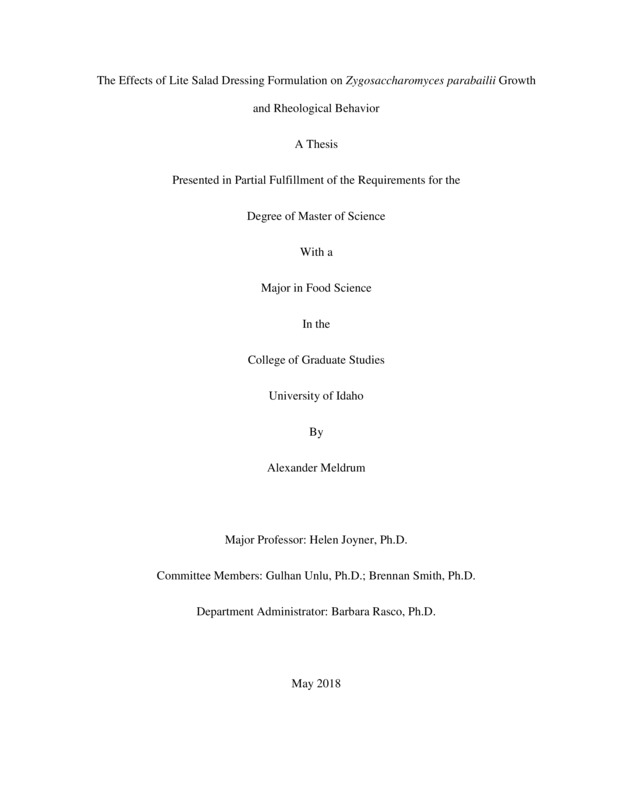The Effects of Lite Salad Dressing Formulation on Zygosaccharomyces parabailii Growth and Rheological Behavior
Meldrum, Alexander Donald. (2017-12). The Effects of Lite Salad Dressing Formulation on Zygosaccharomyces parabailii Growth and Rheological Behavior. Theses and Dissertations Collection, University of Idaho Library Digital Collections. https://www.lib.uidaho.edu/digital/etd/items/meldrum_idaho_0089n_11298.html
- Title:
- The Effects of Lite Salad Dressing Formulation on Zygosaccharomyces parabailii Growth and Rheological Behavior
- Author:
- Meldrum, Alexander Donald
- Date:
- 2017-12
- Keywords:
- Large amplitude oscillatory shear Rheology Salad dressing Spoilage organism Zygosaccharomyces parabailii
- Program:
- Food Science
- Subject Category:
- Food science
- Abstract:
-
Zygosaccharomyces parabailii (Z. parabailii) is a common spoilage yeast that is known to grow in high-acid foods such as wine, juices, soda, and salad dressings. The objectives of this work were to 1) reduce the growth of Z. parabailii in lite salad dressing through adjusting storage conditions, acidulant type, and stabilizer composition and 2) determine changes in salad dressing rheological properties due to these parameter adjustments. Salad dressings were made using a lite dressing formulation prepared with different combinations of acidulants and/or stabilizers and inoculated to a Z. parabailii concentration of 104 CFU/mL. Inoculated salad dressings were stored at 4°, 10°, or 25°C. Z. parabailii concentration in the dressings was monitored over a 45-day storage period. Formulations were also evaluated every 15 days for changes in viscosity and viscoelastic properties. Storage conditions significantly impacted the growth of Z. parabailii in the salad dressings. Samples stored at 4°C tended to have downward trends in growth. Storage at 10 or 25°C was unable to inhibit growth of Z. parabailii. The type of acidulant used had varied results on Z. parabailii growth depending on storage temperature. Overall, the formulation that had acetic acid as the sole acidulant showed the greatest inhibition of Z. parabailii growth at all storage temperatures. Acidulants, either alone or in combination, had different effects on the viscosity and viscoelastic properties of the salad dressings. When polysaccharide-based stabilizers were replaced by milk protein-based stabilizer (milk protein isolate, whey protein isolate, and micellar casein) and acidified by acetic acid, Z. parabailii growth was significantly inhibited at all storage temperatures. The use of protein stabilizers also had a significant effect on the linear and nonlinear viscoelastic properties. In general, lite salad dressings stabilized by a milk protein, acidified with acetic acid, and stored in temperatures at 4°C had the best inhibitory effect on Z. parabailii growth.
- Description:
- masters, M.S., Food Science -- University of Idaho - College of Graduate Studies, 2017-12
- Major Professor:
- Joyner, Helen
- Committee:
- Unlu, Gulhan; Smith, Brennan
- Defense Date:
- 2017-12
- Identifier:
- Meldrum_idaho_0089N_11298
- Type:
- Text
- Format Original:
- Format:
- application/pdf
- Rights:
- In Copyright - Educational Use Permitted. For more information, please contact University of Idaho Library Special Collections and Archives Department at libspec@uidaho.edu.
- Standardized Rights:
- http://rightsstatements.org/vocab/InC-EDU/1.0/

